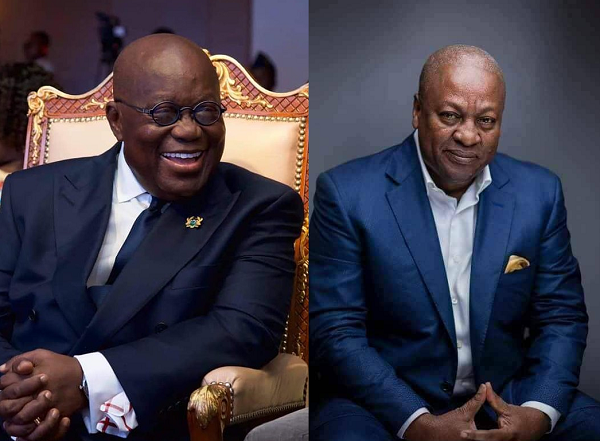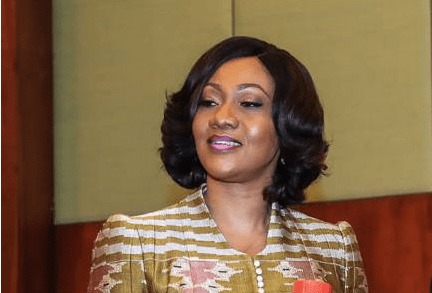
Ghana votes: Akufo-Addo confident of victory, Mahama poised for comeback
Global attention is on Ghana as more than 17 million registered voters cast their ballots to elect a new President and 275 legislators to govern the country for the next four years.
It has the New Patriotic Party’s (NPP’s) President Nana Addo Dankwa Akufo-Addo and former President John Dramani Mahama of the National Democratic Congress (NDC) heavily tipped as the front runners.
The elections, which will be the eighth under the Fourth Republican dispensation, will also register a number of firsts.
Third time
It will be the third time the two front runners, President Akufo-Addo and Mr Mahama, will be facing off, having met in 2016 and 2012, and now in 2020.
The 2020 elections will, therefore, be a key contest to decide who wins the battle.
Many are also watching to see if President Akufo-Addo will retain the seat as President for a second term or whether Mr Mahama will return to the seat of governance to complete a second term as President.
Other candidates
Today’s context has 10 other candidates who are vying for the votes of the over 17 million voters to earn the title of President of Ghana.
They are Rev. Christian Kwabena Andrews of the Ghana Union Movement (GUM), Mr Ivor Kobina Greenstreet, the Convention People's Party (CPP); Madam Akua Donkor of the Ghana Freedom Party (GFP), and the Great Consolidated Popular Party’s (GCPP’s) Dr Henry Herbert Lartey.
The rest are Mr Hassan Ayariga of the All People's Congress (APC), the Liberal Party of Ghana’s (LPG)’s, Percival Kofi Akpaloo; Mr David Asibi Ayindenaba Apasera of the People's National Convention (PNC), Ms Brigitte Akosua Dzogbenuku of the Progressive People's Party (PPP), the National Democratic Party’s (NDP’s) Nana Konadu Agyeman Rawlings, a former First Lady, and an Independent candidate, Alfred Kwame Asiedu Walker.
Firsts
The country itself will be recording a number of firsts in her democratic journey under the Fourth Republican dispensation.
It will be the first time the general election will be held under strict observance of safety protocols against a pandemic, the coronavirus disease (COVID-19).
It will also be the first time 12 presidential candidates will be contesting an election in Ghana with three female presidential candidates, thus producing the country’s longest presidential ballot.
The opposition NDC will also be featuring a first female running mate.
Another first will be the fact that President Akufo-Addo is maintaining his running mate, Dr Mahamudu Bawumia, for the third time running, while former President Mahama has gone for a female running mate, Professor Naana Jane Opoku-Agyemang, making it the first time a major political party has done so.
It will also be the first time a former President, Mr Mahama, will be staging a comeback for an opportunity to complete a second term as President.
Should the NDC presidential candidate win, the country will have its first female Vice-President, the highest to be attained by a female in the country’s political history.
Either way, political pundits believe history will be made as the country heads to the polls.

Results
In the 2016 elections, President Akufo-Addo won the elections with 5,755,758 votes, representing 53.7 per cent of the valid votes cast, to beat Mr Mahama, who had 4,771,188 votes, representing 44.5 per cent.
Mr Mahama won the 2012 elections with 5,573,572 votes representing 50.63 per cent of valid votes cast as against then candidate Akufo-Addo’s 5,263,286, representing 47.81 per cent of votes.
With a difference of about one million votes in the 2016 elections, the NPP says it wants to build upon the figures with a margin of 1.5 million votes, while the NDC intends to claw back its lost votes in 2016 as a result of voter apathy to win.
Voter statistics
In all, 17,027,641 people have been certified to take part in the December 7, 2020 polls in 38,622 polling stations in the 275 constituencies across the country.
Out of the registered voters, 8,810,283 people, representing 51.74 per cent of the voters, are females, while 8,217,358, representing 48.26 per cent, are males.
The nation’s capital seat, the Greater Accra Region, has the highest number of voters of 3.53 million, followed by the Ashanti Region, which has a little over three million voters, while the North East and the Savannah regions recorded the lowest of 289,529 and 298,404 votes respectively.
In the Eastern Region, 1,628,180 registered voters are expected to cast their ballots today while the Central, Western, Northern, and Volta regions registered 1,566,061; 1,185,315; 1,047,539 and 929,322 voters respectively.
For the Upper East, Bono, Bono East, Upper West, Western North, Oti and Ahafo regions, the Electoral Commission (EC) registered 653,730; 648,408; 592,015; 470,271; 465,444; 353,492 and 315,827 respectively.
Global focus
With the world’s attention on Ghana, the beacon of hope in democratic dispensation, stakeholders expect that Ghanaians will put their best foot forward to consolidate the country’s reputation in multiparty democracy.
Ahead of today’s polls, 109,557 voters, made up of security persons, media people and staff of the Electoral Commission (EC), took part in the early voting exercise in all the 275 constituencies last Tuesday.

Fourth Republic
Since Ghana returned to democratic governance in 1993, it has successfully held seven elections with two peaceful transitions of power from a ruling government to the opposition, between the two major political parties, the NPP and the NDC.
The NDC has so far won four elections, while the NPP has won three elections and today’s polls will be the eighth with the NPP trying to equal the NDC’s score, while the NDC wants to extend its number of wins.
Parliament
Currently, the NPP has 169 MPs as against 106 by the NDC. Both the NPP and NDC have campaigned on getting the majority in Parliament, urging voters that a majority in Parliament would enable a sitting President to govern and push the development agenda through.
Ghana is yet to have or experience a hung parliament, where a ruling government has minority in parliament, and how governance under such a hung parliament will look like.
Although there are other political parties contesting the elections, the battle is between the two main political parties, the New Patriotic Party (NPP) and the National Democratic Congress (NDC).
While President Akufo-Addo is campaigning on “Four more for Nana to Do More” for
his good works and performance in government, former President Mahama, on the other hand, has been campaigning on a ‘rescue mission’, appealing to Ghanaians to vote the NDC back to power for it to continue its good works.
Innovative strategies
One innovative strategy adopted by the presidential candidates, especially the front runners, has been the use of text messages and voice calls to reach out to voters in the last days to the election.
Their messages, though diverse in content, simply remind the electorate of today’s elections and encourage them to vote in their favour.
In view of the COVID-19 restrictions, mass rallies had been absent but in its stead, the parties had adopted what they called retail campaigns, door-to-door, house-to-house, telephone calls, use of the social and traditional media to reach out to the electorate.
Another engaging strategy was the stakeholder and community engagements.
Unlike the 2008, 2012 and 2016 elections, the brisk sale of party paraphernalia had been absent ahead of today’s polls.
Akufo-Addo
President Akufo-Addo is confident of winning the presidential elections, as well as a majority in Parliament, citing his numerous achievements during his first term in government.
Apart from the flagship programmes such as the Free Senior High School programme, Planting for Food and Jobs; One-district, One-factory and One constituency, one ambulance, President Akufo-Addo is also riding on the heels of infrastructural projects such as simultaneously starting work on four interchanges – Pokuase, Tema, Tamale and Obetsebi-Lamptey, in his first term as President.
President Akufo-Addo believes under his administration, he has restored Ghana’s dignity on the world stage, hence the need for Ghanaians to retain him at the presidency to protect what he had achieved.
“In four short years, we have cleaned up the mess it took NDC eight years to create. We have also exited the International Monetary Fund (IMF) bailout programme and established a strong foundation,” he said.
Mahama
For ex-President Mahama, he is on a rescue mission to save the country and bring back development, and create jobs for Ghanaians.
Aside from touting the numerous infrastructural projects during his first term as President between 2012 and 2016, Mr Mahama has campaigned on the platform of creating a society that valued all people and created permanent jobs for the unemployed.
Under his Big Push agenda, Mr Mahama intends to inject some $10 billion to dualise roads, complete 200 Community Day senior high schools, finish all the hospital projects that had been abandoned and construct bridges to open up the country.
While giving an assurance that the Free Senior High School policy would not be abandoned, Mr Mahama says private schools will also benefit from the Free SHS education and will do away with the double track, if they return to power.
Survey
Pre-election surveys had put President Akufo-Addo ahead of the pack.
The Political Science Department of the University of Ghana, in its survey,predicted that the President would win by 52.5 per cent while former President Mahama will get 40. 9 per cent.
The Economist Intelligence Unit (EIU), whch also projected a victory for President Akufo-Addo, explained that according to its latest report, the victory would hinge on a number of factors including infrastructure development and ambitious growth plans for cash-crop yield
Security
To ensure a peaceful democratic dispensation, the Ghana Police Service has deployed 62,794 security personnel to ensure the security and safety of Ghanaians during the polls.
They are officers drawn from the various security agencies in the country, namely the Ghana Police Service, the Ghana Fire Service, the Ghana Immigration Service, the Ghana Armed Forces, the Criminal Investigations Department (CID) of the Ghana Police Service and the Customs Division of the Ghana Revenue Authority, among others.
Background
Ghana returned to democratic rule in 1993 after more than a decade of military rule under the late former President Jerry John Rawlings under the Provisional National Defence Council (PNDC).
#GhanaVotes2020.
